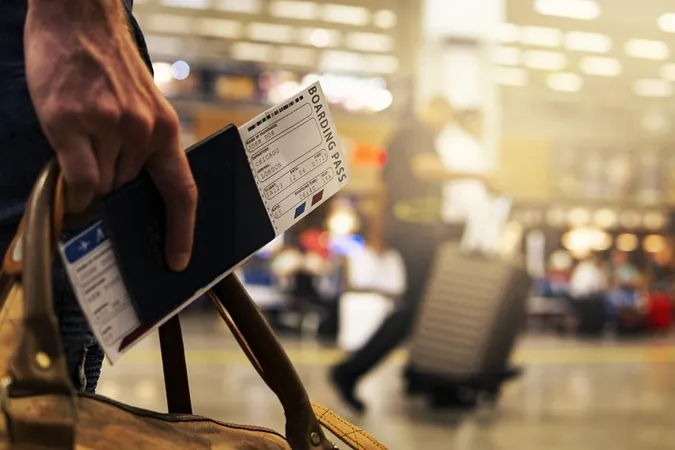
Natural Disasters Disrupting Popular Travel Destinations: Is Your Travel Insurance Enough?
2024-11-28
Author: Rajesh
SINGAPORE - As the year-end holiday season approaches, many Singaporeans look forward to escaping the daily grind for picturesque getaways. Whether it’s enjoying a snowy Christmas in Japan, soaking up the sun on the beaches in Thailand, or indulging in delectable street food in Taiwan, these vibrant locations have become favorites among travelers. Unfortunately, they have also recently become victims of devastating natural disasters.
In a shocking turn of events, a 7.6-magnitude earthquake struck central Japan on New Year’s Day, claiming over 200 lives. In April, Taiwan experienced its most severe earthquake in 25 years, resulting in the deaths of nine individuals and injuring approximately 1,000 others. The crisis has compounded for a Singaporean couple who went missing while hiking in the area during the earthquake and remain unaccounted for.
In the wake of these tragedies, experts from the General Insurance Association of Singapore (GIA) and various insurance companies have been consulted to shed light on the critical nature of travel insurance and what travelers should consider to safeguard their journeys.
1. Why is Travel Insurance Essential?
Experts unanimously agree that having travel insurance is crucial for anyone venturing abroad. Medical expenses often rank as the leading type of claim among policyholders. Jeremy Lian, senior vice-president of technical services at MSIG, emphasized that urgent medical treatments and evacuations can be shockingly expensive, often beyond the financial capacity of typical travelers. Uninsured tourists have recently turned to crowdfunding in desperate attempts to finance emergency medical evacuations, highlighting the need for comprehensive insurance coverage.
The GIA noted a worrying trend: a substantial rise in extreme weather events linked to climate change has led to increased travel disruptions and casualties, further emphasizing the importance of being insured amid such risks.
2. Understanding Known Events and Coverage
Before purchasing travel insurance, it's vital for travelers to comprehend the concept of "known events." These include incidents such as natural disasters, civil unrest, and pandemics that are reported in the media or advised against by travel authorities before a policy is purchased. Generally, claims related to known events will not be covered. For instance, if you buy coverage after an earthquake occurs at your destination, you won’t be protected against claims associated with that earthquake. However, certain other claims, like baggage loss or food poisoning, may still be eligible.
Travelers who secure their policies before a natural disaster strikes might still be covered for claims associated with that event, provided there are no travel advisories issued against the destination.
3. Key Considerations When Choosing Travel Insurance
When selecting travel insurance, it’s essential to scrutinize the policy's benefits, limitations, exclusions, and any special terms. Alvino Kor, senior vice-president of general insurance at Singlife, suggests travelers consider specific riders for activities like winter or water sports. Higher coverage limits are advisable, especially for trips to Europe or the United States, where medical expenses can be significantly high.
Travelers with pre-existing medical conditions should be cognizant that their premiums may be elevated due to heightened coverage needs. It’s imperative to purchase travel insurance well before the trip, as policies can be bought up to 180 days in advance, covering events that may transpire after the purchase date but before the trip.
Conclusion: Protect Yourself While Traveling
With the surge in severe natural disasters around the world, equipping yourself with the right travel insurance is more critical than ever. Before you embark on your holiday adventure, ensure your policy meets your specific needs and clarifies any ambiguities with the insurance provider. Don’t let unforeseen circumstances ruin your anticipated getaway—be prepared and travel smart!


 Brasil (PT)
Brasil (PT)
 Canada (EN)
Canada (EN)
 Chile (ES)
Chile (ES)
 España (ES)
España (ES)
 France (FR)
France (FR)
 Hong Kong (EN)
Hong Kong (EN)
 Italia (IT)
Italia (IT)
 日本 (JA)
日本 (JA)
 Magyarország (HU)
Magyarország (HU)
 Norge (NO)
Norge (NO)
 Polska (PL)
Polska (PL)
 Schweiz (DE)
Schweiz (DE)
 Singapore (EN)
Singapore (EN)
 Sverige (SV)
Sverige (SV)
 Suomi (FI)
Suomi (FI)
 Türkiye (TR)
Türkiye (TR)